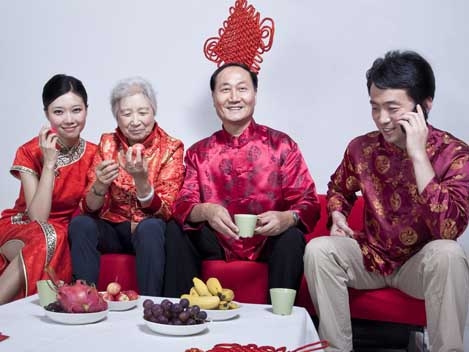
For more than 5,000 years, people have been celebrating the Chinese New Year. The two-week festival marks the start of the lunar calendar and is the most important of Chinese holidays. Festivities start with the new moon on the first day of the New Year and end on the full moon 15 days later, when Chinese communities celebrate the Lantern Festival. Its many rituals include visits to ancestral shrines, parades and fireworks, and feasts with traditional foods.
Food customs include:
Offerings to the Kitchen God, made before the end of the lunar calendar.
A "harmony tray" of nine snacks symbolizing wealth, good fortune and family unity.
Gifts symbolizing wealth and good fortune, such as tangerines for good luck, candies in the shape of gold coins for wealth, flowers or homemade pastries.
Won tons, representing blessings such as good fortune and wealth.
A family feast to reaffirm kinship and pay respect to heads of households.
A whole fish, signifying prosperity and placed pointing to the guest of honor, is often the centerpiece of the meal and the last dish to be served. Fish and fowl served whole with the head suggest "a favorable start and finish."
Tofu, pork, roast duck and chicken may also be served, as they, too, represent good luck. Asian noodles, especially long, whole noodles, are served because they represent long life. For New Year's in Northern China, dumplings are served while noodles are eaten in the south.
Thin vermicelli noodles are called "silvery threads of longevity." Seasoned pork shoulder is "Mist of Harmony." The names of food served during the New Year suggest auspicious things. Some Chinatown merchants even put away foods that sound negative, such as "bittermelon."
Among Chinese dining customs:
Families often dine elbow-to-elbow at round tables to create a circle symbolizing unity and caring.
The head of the household sits facing the doorway, to greet newcomers.
The most senior diners are served first; children generally serve their elders.
Before a meal can begin, each child must invite the elders to eat.
Chopsticks are never placed across the bowl or vertically in it, because that symbolizes death and bad fortune.
Knives are not set on the table, as they are considered cooking utensils. You might cut off your fortune if you use a knife on New Year's Day.





